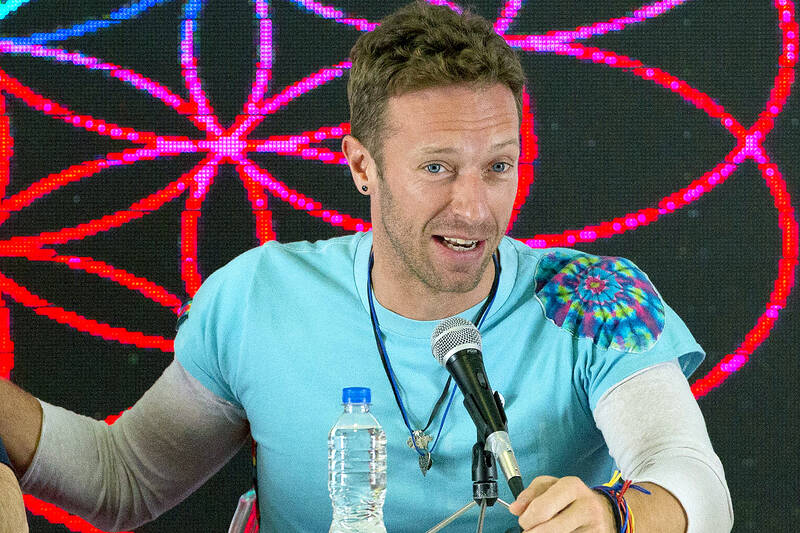British rock band Coldplay is planning to play a concert in Kaohsiung in November as part of the Asian and Australian leg of its Music of the Spheres World Tour, Live Nation Taiwan said on Monday.
The show would take place at Kaohsiung National Stadium at 7:30pm on Nov. 11, following two concerts in Tokyo the week before, the organizers said.
It would be the band’s first concert in Kaohsiung and the second time that its tours stop in Taiwan, after two concerts in Taoyuan in 2017.

Photo: AP
Coldplay’s world tour seeks to be sustainable and low-carbon, with kinetic dance floors installed at venues and stationary bikes that allow fans to contribute to the concerts’ power needs, the band says on its Web site.
Formed in 1996, Coldplay is vocalist and pianist Chris Martin, guitarist Jonny Buckland, bassist Guy Berryman, drummer Will Champion and creative director Phil Harvey.
In 2000, Coldplay released its debut album Parachutes, which featured the breakthrough single Yellow, and won a Grammy Award for Best Alternative Music Album in 2002.
Live Nation said that since the tour’s first date in March last year, the band has sold more tickets than any other artist in the world, receiving rave reviews from fans and picking up accolades including Favorite Touring Artist at last year’s American Music Awards and Tour of The Year at this year’s iHeartRadio Awards.
For the concert in Kaohsiung, tickets can be preordered by Live Nation members from 12pm to 23:59pm on Wednesday next week on the event management agency’s Web site, and the remaining tickets would become available to the public the next day at noon on the Ticketmaster Web site.
Live Nation wrote on Facebook that ticket prices and a seating map would be released soon.
Coldplay is also to perform in Jakarta, Kuala Lumpur and Perth, Australia.

Twenty-four Republican members of the US House of Representatives yesterday introduced a concurrent resolution calling on the US government to abolish the “one China” policy and restore formal diplomatic relations with Taiwan. Led by US representatives Tom Tiffany and Scott Perry, the resolution calls for not only re-establishing formal relations, but also urges the US Trade Representative to negotiate a free-trade agreement (FTA) with Taiwan and for US officials to advocate for Taiwan’s full membership in the UN and other international organizations. In a news release announcing the resolution, Tiffany, who represents a Wisconsin district, called the “one China” policy “outdated, counterproductive

Actress Barbie Hsu (徐熙媛) has “returned home” to Taiwan, and there are no plans to hold a funeral for the TV star who died in Japan from influenza- induced pneumonia, her family said in a statement Wednesday night. The statement was released after local media outlets reported that Barbie Hsu’s ashes were brought back Taiwan on board a private jet, which arrived at Taipei Songshan Airport around 3 p.m. on Wednesday. To the reporters waiting at the airport, the statement issued by the family read “(we) appreciate friends working in the media for waiting in the cold weather.” “She has safely returned home.

A Vietnamese migrant worker on Thursday won the NT$12 million (US$383,590) jackpot on a scratch-off lottery ticket she bought from a lottery shop in Changhua County’s Puyan Township (埔鹽), Taiwan Lottery Co said yesterday. The lottery winner, who is in her 30s and married, said she would continue to work in Taiwan and send her winnings to her family in Vietnam to improve their life. More Taiwanese and migrant workers have flocked to the lottery shop on Sec 2 of Jhangshuei Road (彰水路) to share in the luck. The shop owner, surnamed Chen (陳), said that his shop has been open for just

MUST REMAIN FREE: A Chinese takeover of Taiwan would lead to a global conflict, and if the nation blows up, the world’s factories would fall in a week, a minister said Taiwan is like Prague in 1938 facing Adolf Hitler; only if Taiwan remains free and democratic would the world be safe, Deputy Minister of Foreign Affairs Francois Wu (吳志中) said in an interview with Italian newspaper Corriere della Sera. The ministry on Saturday said Corriere della Sera is one of Italy’s oldest and most read newspapers, frequently covers European economic and political issues, and that Wu agreed to an interview with the paper’s senior political analyst Massimo Franco in Taipei on Jan. 3. The interview was published on Jan. 26 with the title “Taiwan like Prague in 1938 with Hitler,” the ministry